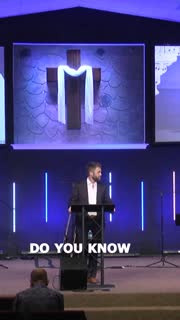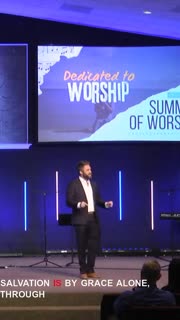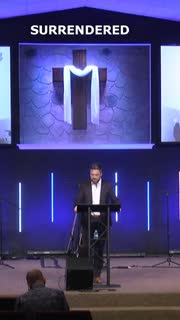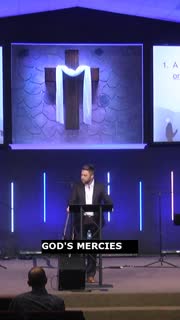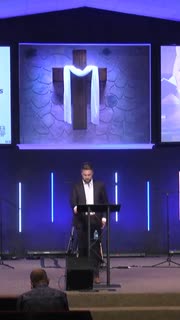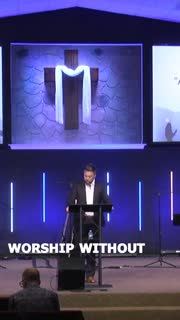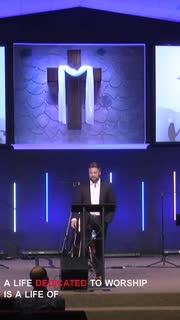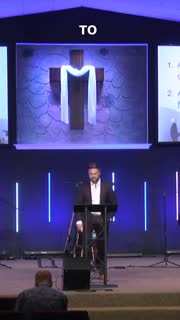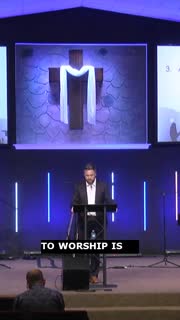Living Sacrificially: A Life of Dedicated Worship
Devotional
Sermon Summary
Bible Study Guide
Sermon Clips
### Quotes for Outreach
1. "Do you know that God loves you today? Do you know that he wants what's best for you today? He deeply cares for you." [13:13] (10 seconds)
2. "Salvation is by grace alone, through faith alone, in Christ alone, period. No exceptions. Amen. And so when we're talking about laying our lives on the altar as a living sacrifice to his lordship this morning, I want to be clear that you and I are not earning a thing. We're responding. It's a response to the love. That God has had for his people through his son, Christ Jesus." [15:06] (35 seconds)
3. "A life surrendered is a life of dedicated worship and as we come to Romans 12 this morning, just to give you a little context, the apostle has been expecting, abounding upon the doctrines of salvation and justification for the past 11 chapters. I mean, he's laying it down, okay? He's fully laying it down." [20:24] (23 seconds)
4. "God's mercies are the only sustainable source for a life of perseverance and conformity to the image of Christ. And remember, at the beginning, I said, we're not earning anything. He loved us first, and we're loving him in return. He says, if you keep my commandments, you love me, right?" [33:15] (24 seconds)
5. "We deserve death, hell, and the grave. And just think about it. We are so, we oftentimes, me included, we get so wrapped up in our day-to-day lives and we get so disconnected from the reality of what we deserved and our depravity that we forget what we've been saved from." [34:45] (22 seconds)
### Quotes for Members
1. "A theologian once said, those who have the deepest appreciation of grace do not go on sinning. Do a lifestyle of sin. Moreover, fear produces the obedience of slaves while love engenders the obedience of sons. You understand what that means, right? Love is driving our obedience through faith and we're going to be talking about that this morning and what God has done through his son, Jesus Christ, should produce gratitude in our hearts and if true gratitude is true, if true gratitude is present in a believer, a life of surrender to his lordship is our proper, our logical response, our proper worship." [19:32] (55 seconds)
2. "Worship without theology is bound to degenerate into idolatry. Do you know what I mean when I say that? Worship without theology, worship without boundaries is a free-for-all, and it's idolatry because we're worshiping a false god. We must know who God is, what he said, and understand the doctrines of salvation and the doctrines that are in God's word so that we don't degenerate into idolatry." [22:01] (32 seconds)
3. "A life dedicated to worship is a life of ongoing surrender ongoing and why is that right why is it ongoing because we have a really bad habit of placing our life on the altar and then taking it right back off again don't we and so as we continue to cling to Christ we have our hearts are prone to wander and we're to always be repenting and turning back and turning back and turning back and turning back and turning back and turning back to the Lord resurrendering those areas of our life that we've taken hold of again and place them back on the altar again it would be preferred that we leave it there right but unfortunately we have to be aware of these things and cognizant of well I can't even speak this more be cognizant of turning back and placing whatever that might be back on the altar" [25:49] (69 seconds)
4. "A life dedicated to worship is sacrificial. He says, present our bodies as a living sacrifice. When we talk about presenting our bodies, I want to make note that he's not just talking about the physical members of our body, but everything that that entails, the soul, the will, the mind, and the body. Some of us might be trying to get all that we can get from God, versus giving all that we can give to him." [41:56] (41 seconds)
5. "A life dedicated to worship is both positional and progressive. And yes, church, this is my last point. Don't go to sleep on me, okay? There is light at the end of the tunnel. Thank you, Lord, for getting me through. But Paul says, present your bodies as a living sacrifice, holy and acceptable unto God. Holy and acceptable. And as Aaron said earlier in his prayer, as one of our songs said in the lyrics, when we talk about the terms holy and acceptable, we are made this way through Christ. And Christ's completed work makes His children both positionally and progressively righteous. Positionally holy and progressively being conformed more and more to the image of Christ Jesus." [01:05:26] (59 seconds)
Ask a question about this sermon
1. "Do you know that God loves you today? Do you know that he wants what's best for you today? He deeply cares for you." [13:13] (10 seconds)
2. "Salvation is by grace alone, through faith alone, in Christ alone, period. No exceptions. Amen. And so when we're talking about laying our lives on the altar as a living sacrifice to his lordship this morning, I want to be clear that you and I are not earning a thing. We're responding. It's a response to the love. That God has had for his people through his son, Christ Jesus." [15:06] (35 seconds)
3. "A life surrendered is a life of dedicated worship and as we come to Romans 12 this morning, just to give you a little context, the apostle has been expecting, abounding upon the doctrines of salvation and justification for the past 11 chapters. I mean, he's laying it down, okay? He's fully laying it down." [20:24] (23 seconds)
4. "God's mercies are the only sustainable source for a life of perseverance and conformity to the image of Christ. And remember, at the beginning, I said, we're not earning anything. He loved us first, and we're loving him in return. He says, if you keep my commandments, you love me, right?" [33:15] (24 seconds)
5. "We deserve death, hell, and the grave. And just think about it. We are so, we oftentimes, me included, we get so wrapped up in our day-to-day lives and we get so disconnected from the reality of what we deserved and our depravity that we forget what we've been saved from." [34:45] (22 seconds)
### Quotes for Members
1. "A theologian once said, those who have the deepest appreciation of grace do not go on sinning. Do a lifestyle of sin. Moreover, fear produces the obedience of slaves while love engenders the obedience of sons. You understand what that means, right? Love is driving our obedience through faith and we're going to be talking about that this morning and what God has done through his son, Jesus Christ, should produce gratitude in our hearts and if true gratitude is true, if true gratitude is present in a believer, a life of surrender to his lordship is our proper, our logical response, our proper worship." [19:32] (55 seconds)
2. "Worship without theology is bound to degenerate into idolatry. Do you know what I mean when I say that? Worship without theology, worship without boundaries is a free-for-all, and it's idolatry because we're worshiping a false god. We must know who God is, what he said, and understand the doctrines of salvation and the doctrines that are in God's word so that we don't degenerate into idolatry." [22:01] (32 seconds)
3. "A life dedicated to worship is a life of ongoing surrender ongoing and why is that right why is it ongoing because we have a really bad habit of placing our life on the altar and then taking it right back off again don't we and so as we continue to cling to Christ we have our hearts are prone to wander and we're to always be repenting and turning back and turning back and turning back and turning back and turning back and turning back to the Lord resurrendering those areas of our life that we've taken hold of again and place them back on the altar again it would be preferred that we leave it there right but unfortunately we have to be aware of these things and cognizant of well I can't even speak this more be cognizant of turning back and placing whatever that might be back on the altar" [25:49] (69 seconds)
4. "A life dedicated to worship is sacrificial. He says, present our bodies as a living sacrifice. When we talk about presenting our bodies, I want to make note that he's not just talking about the physical members of our body, but everything that that entails, the soul, the will, the mind, and the body. Some of us might be trying to get all that we can get from God, versus giving all that we can give to him." [41:56] (41 seconds)
5. "A life dedicated to worship is both positional and progressive. And yes, church, this is my last point. Don't go to sleep on me, okay? There is light at the end of the tunnel. Thank you, Lord, for getting me through. But Paul says, present your bodies as a living sacrifice, holy and acceptable unto God. Holy and acceptable. And as Aaron said earlier in his prayer, as one of our songs said in the lyrics, when we talk about the terms holy and acceptable, we are made this way through Christ. And Christ's completed work makes His children both positionally and progressively righteous. Positionally holy and progressively being conformed more and more to the image of Christ Jesus." [01:05:26] (59 seconds)
